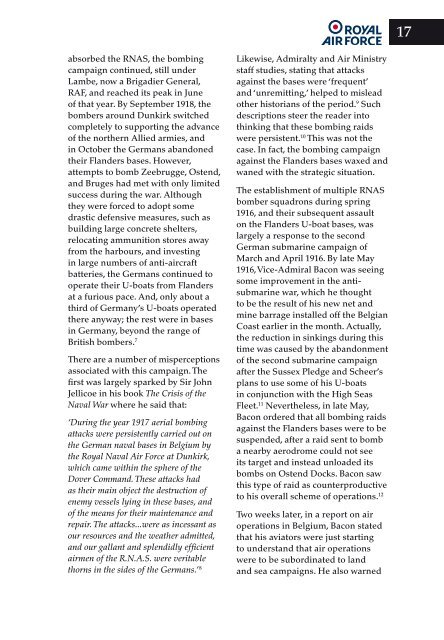You also want an ePaper? Increase the reach of your titles
YUMPU automatically turns print PDFs into web optimized ePapers that Google loves.
absorbed the RNAS, the bombing<br />
campaign continued, still under<br />
Lambe, now a Brigadier General,<br />
RAF, and reached its peak in June<br />
of that year. By September 1918, the<br />
bombers around Dunkirk switched<br />
completely to supporting the advance<br />
of the northern Allied armies, and<br />
in October the Germans abandoned<br />
their Flanders bases. However,<br />
attempts to bomb Zeebrugge, Ostend,<br />
and Bruges had met with only limited<br />
success during the war. Although<br />
they were forced to adopt some<br />
drastic defensive measures, such as<br />
building large concrete shelters,<br />
relocating ammunition stores away<br />
from the harbours, and investing<br />
in large numbers of anti-aircraft<br />
batteries, the Germans continued to<br />
operate their U-boats from Flanders<br />
at a furious pace. And, only about a<br />
third of Germany’s U-boats operated<br />
there anyway; the rest were in bases<br />
in Germany, beyond the range of<br />
British bombers. 7<br />
There are a number of misperceptions<br />
associated with this campaign. The<br />
first was largely sparked by Sir John<br />
Jellicoe in his book The Crisis of the<br />
Naval War where he said that:<br />
‘During the year 1917 aerial bombing<br />
attacks were persistently carried out on<br />
the German naval bases in Belgium by<br />
the Royal Naval <strong>Air</strong> Force at Dunkirk,<br />
which came within the sphere of the<br />
Dover Command. These attacks had<br />
as their main object the destruction of<br />
enemy vessels lying in these bases, and<br />
of the means for their maintenance and<br />
repair. The attacks...were as incessant as<br />
our resources and the weather admitted,<br />
and our gallant and splendidly efficient<br />
airmen of the R.N.A.S. were veritable<br />
thorns in the sides of the Germans.’ 8<br />
Likewise, Admiralty and <strong>Air</strong> Ministry<br />
staff studies, stating that attacks<br />
against the bases were ‘frequent’<br />
and ‘unremitting,’ helped to mislead<br />
other historians of the period. 9 Such<br />
descriptions steer the reader into<br />
thinking that these bombing raids<br />
were persistent. 10 This was not the<br />
case. In fact, the bombing campaign<br />
against the Flanders bases waxed and<br />
waned with the strategic situation.<br />
The establishment of multiple RNAS<br />
bomber squadrons during spring<br />
1916, and their subsequent assault<br />
on the Flanders U-boat bases, was<br />
largely a response to the second<br />
German submarine campaign of<br />
March and April 1916. By late May<br />
1916, Vice-Admiral Bacon was seeing<br />
some improvement in the antisubmarine<br />
war, which he thought<br />
to be the result of his new net and<br />
mine barrage installed off the Belgian<br />
Coast earlier in the month. Actually,<br />
the reduction in sinkings during this<br />
time was caused by the abandonment<br />
of the second submarine campaign<br />
after the Sussex Pledge and Scheer’s<br />
plans to use some of his U-boats<br />
in conjunction with the High Seas<br />
Fleet. 11 Nevertheless, in late May,<br />
Bacon ordered that all bombing raids<br />
against the Flanders bases were to be<br />
suspended, after a raid sent to bomb<br />
a nearby aerodrome could not see<br />
its target and instead unloaded its<br />
bombs on Ostend Docks. Bacon saw<br />
this type of raid as counterproductive<br />
to his overall scheme of operations. 12<br />
Two weeks later, in a report on air<br />
operations in Belgium, Bacon stated<br />
that his aviators were just starting<br />
to understand that air operations<br />
were to be subordinated to land<br />
and sea campaigns. He also warned<br />
17

















